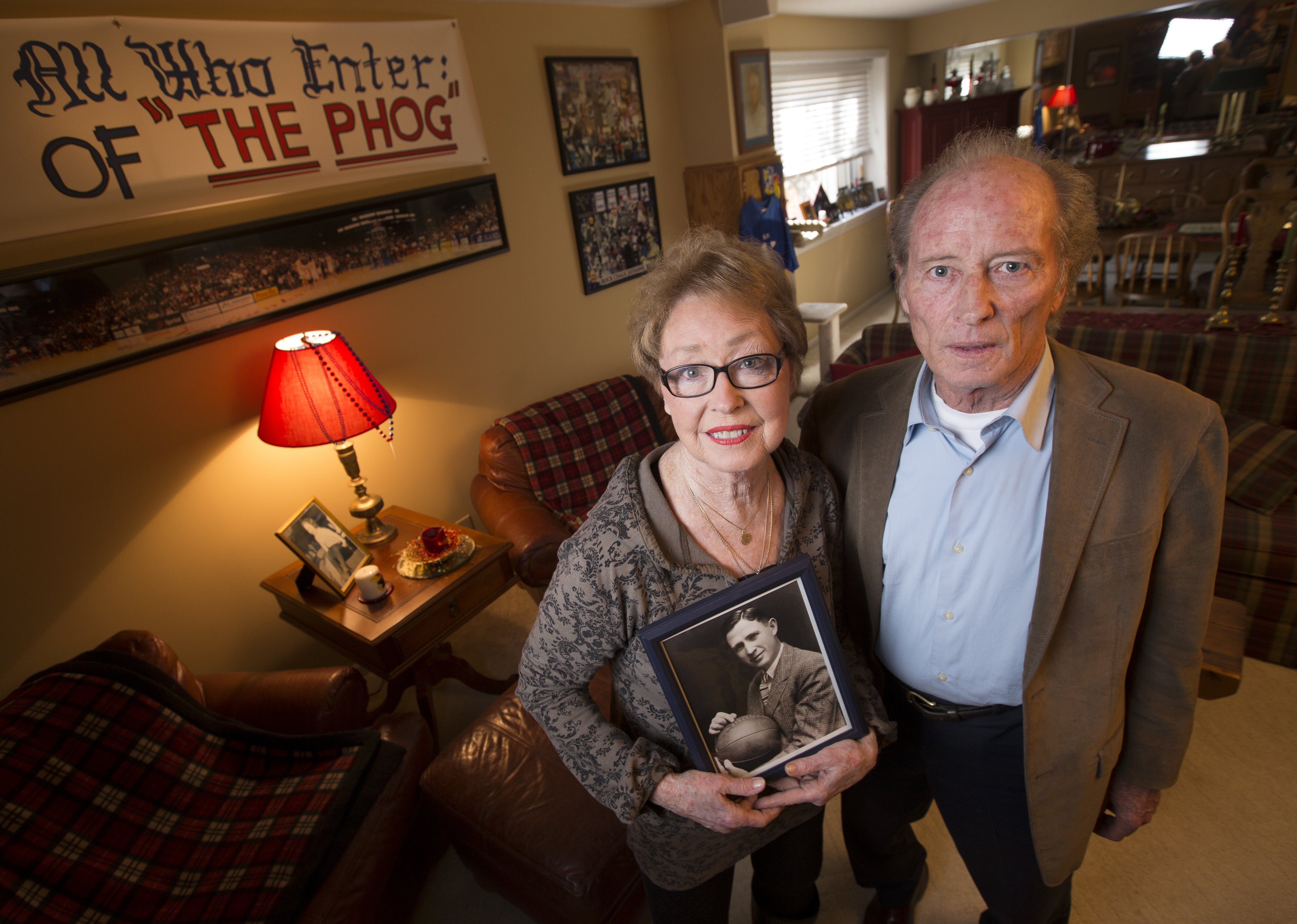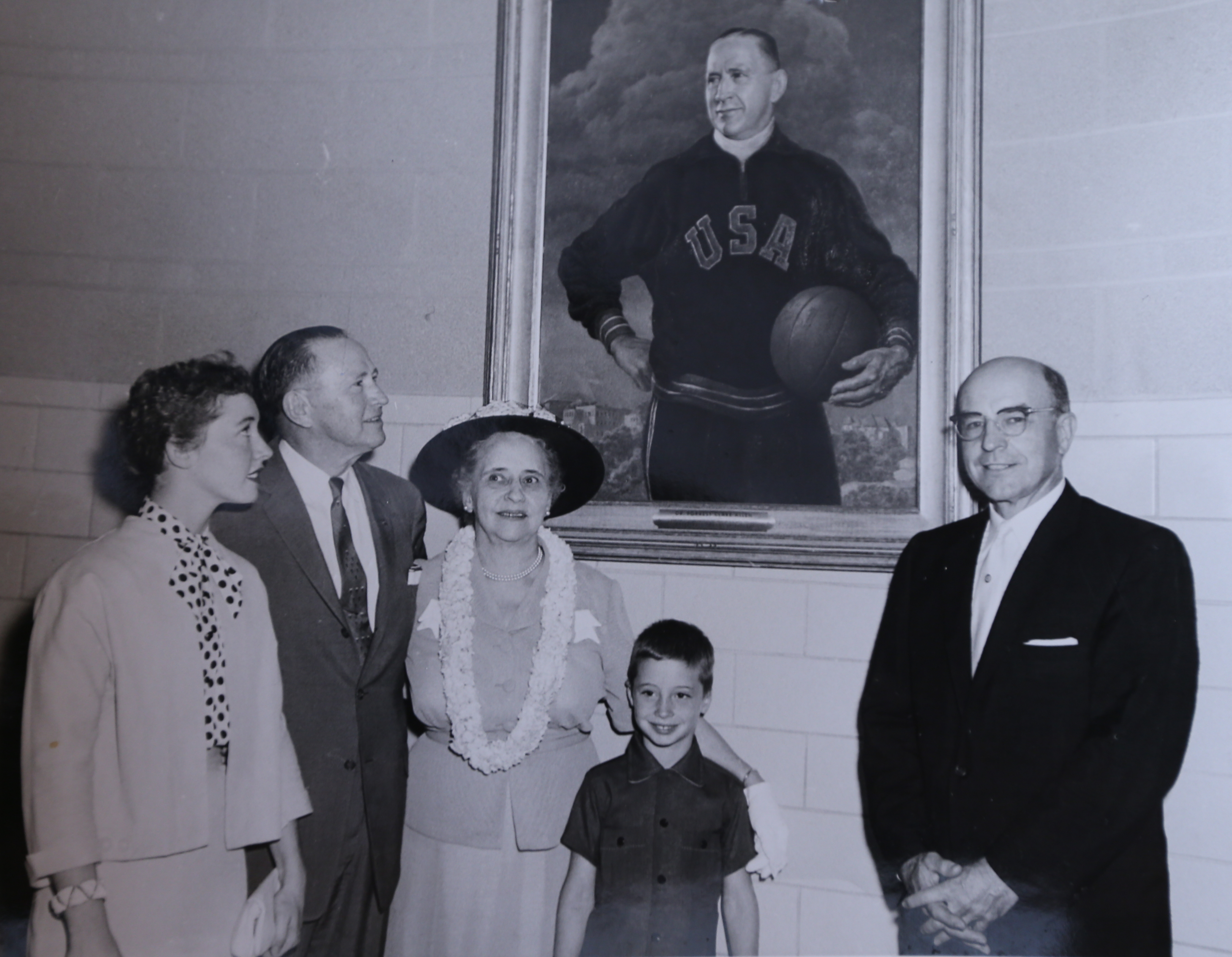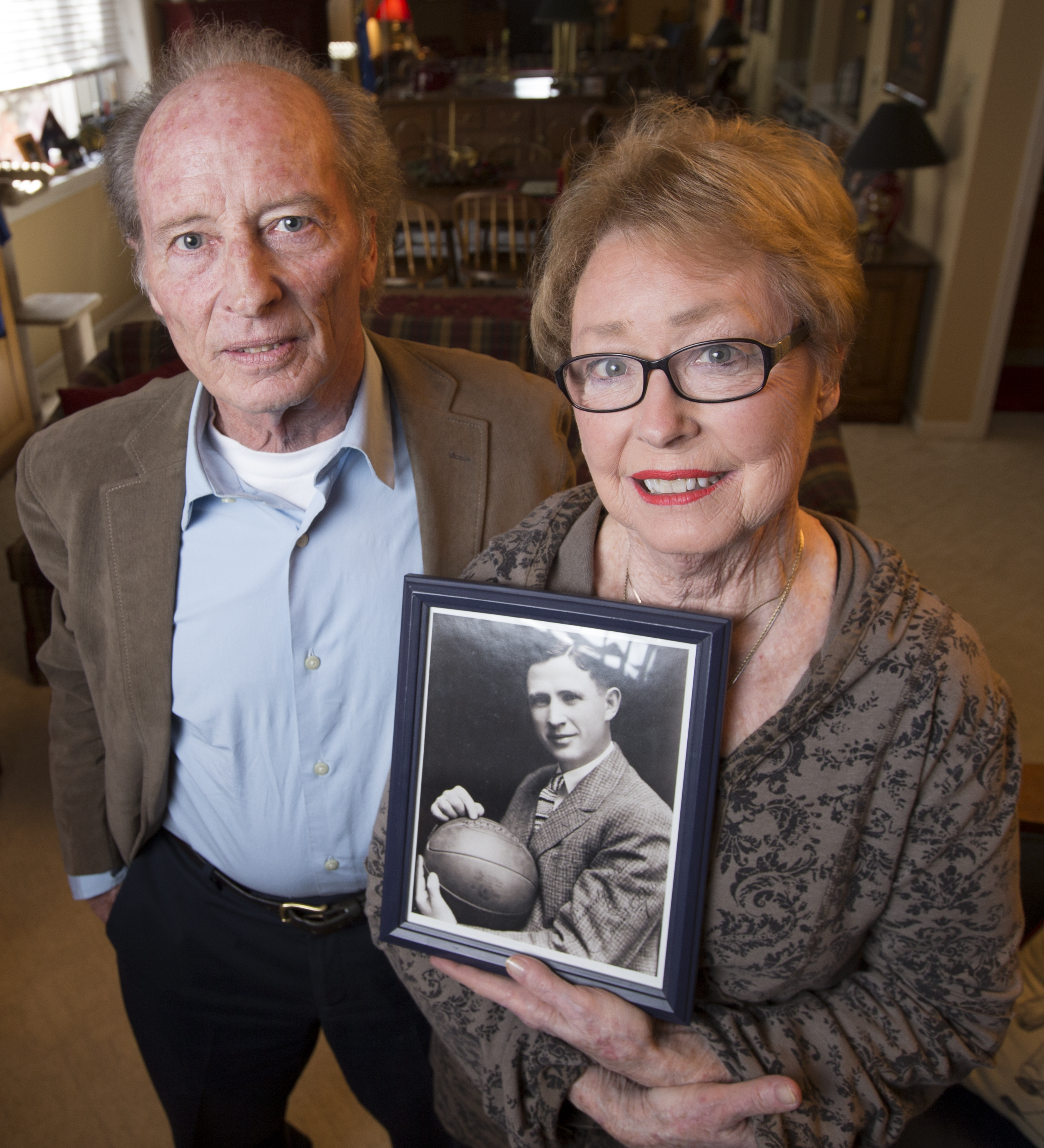Lawhorn’s Lawrence: The grandkids of Phog Allen

Siblings Judy Morris and Mick Allen, who are the grandchildren of legendary Kansas basketball coach Phog Allen, are pictured with a photo of their grandfather when he was in his 40s, according to Morris.
Beware of the Phoggy.
The Phoggy? Don’t put that on the banner. That doesn’t sound very intimidating.
But it did sound right around the family dinner table. “Phoggy” was the name grandchildren bestowed upon legendary Kansas University basketball coach Forrest “Phog” Allen.
“I kind of grew up on his knee,” says Judy Morris, one of three of Phog’s grandchildren who still live in Lawrence. “His sense of humor was over the edge, and he loved his grandchildren.”

Judy Morris, left, and her brother Mick Allen are pictured with Phog Allen and his wife, Bessie Allen, and Kansas University chancellor Clarke Wescoe during the hanging of a portrait of Allen after he had served as the head coach of the U.S. men's basketball Olympic team.
So much so that at least one grandchild was allowed to break what has become a cardinal sin in the Jayhawk basketball family: storming the court. Morris perhaps holds the distinction for most times storming the court after a Jayhawk victory. Morris remembers her postgame routine when the Jayhawks played in old Hoch Auditorium.
“Boy, did I stick close to Phoggy,” Morris said. “After a win, I was on the court whenever I could be. That was the place to be.”
Being next to Coach Allen was generally a good place to be. Mick Allen — a Lawrence attorney and Judy’s brother — remembers meeting Billy Martin, Yogi Berra, Mickey Mantle and other famed New York Yankees who would occasionally come to Lawrence to visit Allen to receive treatment at his osteopathic medical office on East Eighth Street. In addition to being a pioneer in basketball coaching, Allen also is widely credited with being one of the early leaders in the use of athletic training.
Of course, there also were opportunities to meet some famous basketball players — or at least some who would become famous.
Wilt Chamberlain certainly would be near the top of that list. There are lots of good stories about Wilt to be told around an Allen family dinner table. He was the top recruit in the country in the day, and KU was in competition with Wilt’s hometown school of Villanova to land him. Brace yourself, kids: there were no signing day specials on ESPN to figure out where a college basketball recruit was headed. Coach Allen learned about it when — get this — newspaper writers called to tell him that Wilt was coming to KU. Mick tells the story of what his grandfather said: “That’s great. I hope he comes out for basketball.”
You’ve probably heard that one before. It is a well-known Allen story. There are others, and not all of them have Coach Allen as the central figure. A favorite is about a recruiting trip Wilt took to KU. Judy and Mick’s father — Mitt Allen, who was a longtime Lawrence attorney — knew that the black fraternity at KU was having a social event that evening. Mitt called the fraternity president to ask if Wilt could attend, and if he would make sure that someone would take the time to at least dance with Wilt. Mitt called back a bit later in the evening to see how the event was progressing. The fraternity president said Wilt had a date and was having a wonderful time. Mitt became just a bit concerned, Judy recalls.
“He asked: Is Wilt having a really good time with his date?” Judy remembers. The fraternity president answered honestly. “I sure hope not. I fixed him up with my girlfriend.”
Mitt’s assistance in off-court basketball issues wasn’t uncommon, both Mick and Judy remember. Mitt was a two-term county attorney in Douglas County, including during the time period that Chamberlain was in town. Mick recalls the time that his father learned that Wilt was denied service at a local greasy spoon.
“Dad, I think, had some selfish interests in making Wilt happy,” Mitt concedes, but he said he’ll always remember what happened next: His father went to the small diner and noticed that it was just a pit, with health code violations everywhere.
“Dad told the owner that he didn’t know why anybody would want to eat here, but that Wilt would be back the next day,” Mick recalls. “He said Wilt will sit here and you will serve him, or else the next visitor you will have will be from the health department. They served Wilt the next day.”
Mitt also was the county attorney when Clyde Lovellette was being recruited. Lovellette also was a big recruiting prize, although that didn’t stop Judy from becoming annoyed with him. Why? Fireworks. Lovellette had never shot any at his Indiana home, and since he was visiting near July 4, there were plenty of fireworks around. Coach Allen ended up giving all of Judy’s fireworks stash to Lovellette.
Don’t worry, Judy got the last laugh.
Lovellette returned to his hotel room in The Eldridge and proceeded to start shooting fireworks out the window, Judy recalls.
“That got both my dad as county attorney and grandfather down to The Eldridge hotel,” Judy says. “I thought it was funny, but I’m not sure everybody else thought it was.”
Yes, there are a lot of great stories with Kansas basketball. So many, in fact, that it is easy to forget that the people in them aren’t just characters. Phog Allen isn’t just a name for a fantastic basketball arena.
The days of Phog Allen the man seem like a long time ago. Coach Allen died in 1974. But he still has a multitude of living grandchildren, with the non-Lawrence ones being as close as Kansas City and as far away as California. Judy said she is gratified that Allen isn’t forgotten. The fieldhouse helps ensure that, and the title of “Father of Basketball Coaching” seems likely to be around for a bit longer too.

Siblings Mick Allen and Judy Morris, who are the grandchildren of legendary Kansas basketball coach Phog Allen, are pictured with a photo of their grandfather when he was in his 40s, according to Morris.
But to her the simpler title of “Grandfather” is still important. She’s collaborating on a book that is expected out in 2017 that will focus more on the life of Allen than previous books have.
“I don’t think they know as much about him as I would like them to know,” Judy says of the public’s knowledge of Allen.
She now tells stories about how Phog’s family grew up traveling from Missouri town to Missouri town. Phog’s father would struggle to make money as an accountant, while Phog would earn money in the fighting ring as a 17- or 18-year-old.
“He was a skinny, spidery looking little bird,” Judy says. “But he was the Allen who would take on the local whatever to make money for the Allen family.”
Judy notes that the family knows Allen received an osteopathic medical degree, but is unsure of any other schooling he ever had. “His use of the English language was amazing, though,” Judy recalls.
Sometimes he would use it to be biting and cynical, Mick recalls, and certainly it wasn’t always easy being the grandchild of Phog. Mick said there was jealously among KU faculty members of Phog’s fame. Sometimes family members felt that too.
“I remember getting a phone call from a high school classmate years ago,” Judy recalls. “She called to apologize for hating me in high school.”
But most of the time, as you would imagine, it has been really good to be an Allen in Lawrence. No, they don’t get free tickets to the fieldhouse, although Mick says he does get to see some practices that are closed to the general public. Both Mick and Judy speak highly of Coach Bill Self, and also of former Coach Larry Brown, who they said did a lot to help reconnect their father with the KU basketball program.
Mitt Allen died in 1988, just a few days after Brown and the Jayhawks won the National Championship.
“It was sort of like the last thing he needed to see through,” Mick says.
Now we get to that time — March Madness — that is ripe for more memories to be made around KU basketball. The Allens already have plenty, but, of course, they are like the rest of us and are rooting hard for a few more.
The games will begin, with a sudden ending or jubilation waiting around every corner. The great history of Kansas basketball — which in so many ways is the history of the game itself — will certainly get mentioned by announcers, fans and others in the coming days. At some point, you’ll surely hear the phrase uttered: Beware of the Phog.
But now you will know there is a corollary to that: Love the Phoggy.







